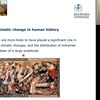1820

Selling pictures. Pictorial Economy and Commoditization 1820–2020
This project will place the current discussions concerning AI-generated images in a historical context, comparing it to two previous technological breakthroughs that have affected the use of pictures for commercial purposes.
Swedish Economic Growth and Education Since 1800
2008. Canadian Journal of Economics 41(1), February, 166-185.

Anna Näslund
I am professor of Art History at Stockholm University and researcher at the Institute for Futures Studies. My research focuses on visual culture, picture theory and digitization. The project Selling Pic traces the genealogy of contemporary AI-generated image hype over 200 years of promoting technologies for the production, reproduction, and circulation of pictures on a mass scale. It aims to understand the historical role of pictures not merely as commodities but as agents of commerce. The project focuses on emerging picture techniques in the 1820s, 1920s, and 2020s, examining iconographic and discursive patterns in pictures of mass reproduction (metapictures) and comparing vernacular picture theories—expressed in advertising copy and trade journalism—with canonical picture theories. Rooted in historical material practices, the project seeks to clarify and expand our understanding of how and why pictures play a central role in the work of selling in modern and contemporary societies.

Nina Lager Vestberg
I’m a professor of visual culture in the Department of Art and Media Studies at NTNU (Norwegian University of Science and Technology) in Trondheim, where I coordinate the Media, Data, Museumsresearch g
Long-run income and wealth inequality, and the potential impact on inheritance flows
Jesper Roine, Associate Professor at Stockholm Institute of Transition Economics I will present what we know about long run income and wealth distribution across countries and also connect these findin
Episodes of liberalization in autocracies: a new approach to quantitatively studying democratization
Political Science Research and Methods, 1-20 Abstract This paper introduces a new approach to the quantitative study of democratization. Building on the comparative case-study and large-N literature, it

Fredrik Charpentier Ljungqvist: Impacts of past climate variability – lessons for the 21st century
The talk summarizes key findings of state-of-the-art research on how climate variability and change have affected different aspects of human history in medieval and early modern Europe (c. 700–1815 CE
Personhood and legal status: reflections on the democratic rights of corporations
Netherlands Journal of Legal Philosophy 47:1, pp. 13-28., doi: 10.5553/NJLP/.000068. Introduction Corporations are regularly ascribed rights and duties, yet few believe they should have the right to part
Fredrik Charpentier Ljungqvist: Impacts of past climate variability – lessons for the 21st century
Place: Institute for Futures Studies, Holländargatan 13, Stockholm or onlineREGISTERResearch seminar with Fredrik Charpentier Ljungqvist, Professor of History.ABSTRACT The talk will start with summaris
Should corporations be allowed to vote?
Democracy was once defined so that neither women nor poor could vote. Nowadays this sounds absurd and it’s obvious that both women and poor constitute as important parts of society as rich men, and sh








